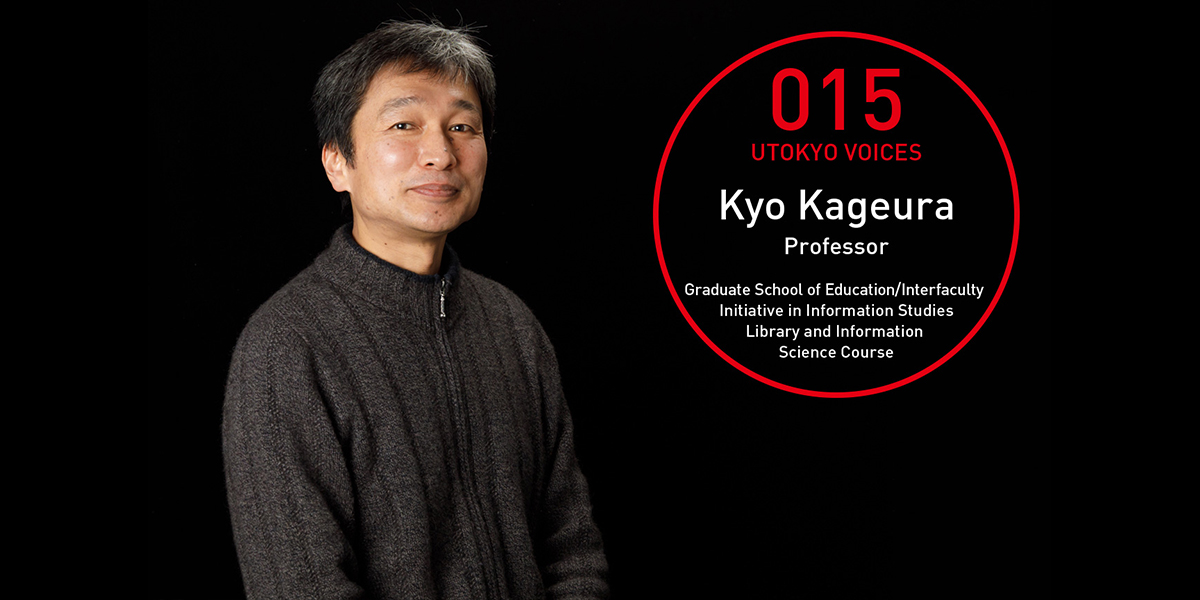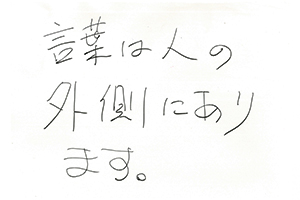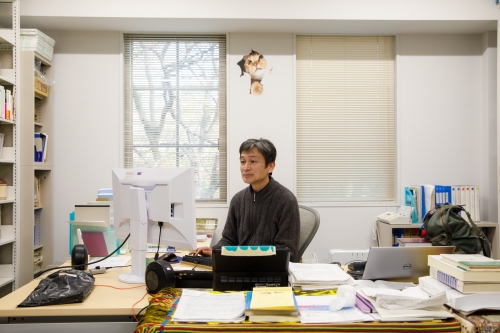Our Words Exist Outside of Us | UTOKYO VOICES 015


Our Words Exist Outside of Us
Kyo Kageura was obsessed with dictionaries. “When I was in junior high school, I collected around 100 dictionaries. My favorites were the Daijiten and Jigen dictionaries of Chinese characters, the Daigenkai Japanese dictionary, the Crown Dictionary of English Idiomatic Phrases, and the Crown French-Japanese Dictionary, among others. Every day, I would take a dictionary to my futon and enjoy looking up words. I think I was interested in the external form of the symbols and the knowledge they recorded,” recalls Kageura.
He later learned of the field of Library and Information Studies from his two older sisters, who went to the same high school and university. When considering what to study at university, he says, “Library and Information Studies, which handles records of knowledge, piqued my interest, rather than Linguistics or Media Studies.” Library and Information Studies, the research of how expressions of knowledge and information are collected, arranged, and made available for use, attracted Kageura.
In 1990, while a research assistant at the National Center for Science Information Systems, he studied at the University of Manchester, UK, and wrote his doctoral thesis on specialist terminology, an area which did not attract much attention. Compared to phonemes and grammar, the elements of terminology are vast, and systemization is problematic. For this reason, research into it has fallen behind. Regarding the difficulty of terminology research, Kageura says, “Not even linguists have a thorough understanding of terminology as a phenomenon and the problems it entails.”
Words must be understood as collections. For example, “Even if there were a giant dictionary which contained all the terms people wanted, it would be too vast for elementary school students to use. This is because they wouldn’t be able to understand what to search for and wouldn’t understand all the words used in the explanations. It is not the case that the more words a dictionary contains, the better it is. To date, we have relied on no more than hit-and-miss experience to determine what level of terminology elementary students comprehend, without bringing real clarity to the issue.” The same kind of thing applies to the issue libraries face concerning what kind of knowledge they should gather in their collections.
Kageura says that the “system” issue in terminology and libraries can be applied to mistranslations by translators. “Translators make mistakes not because they don’t understand, but because they don’t know whether or not they understand. So, why is it that good translators can sense when they don’t understand something? It seems to be related to the systematization of understanding things. Even here, the problem concerns systems of knowledge and concepts.”
This is also linked to the issue of how to express, through words, concepts which can be expressed only in words. Kageura thinks that to solve this problem, “the concept of Cartesian use of language [language use for the purpose of enabling the clear sharing of understanding] is the key.” In addition to conducting theoretical research on this issue, from a practical standpoint he has also developed and publicized a translation learning support system. He says that it is not enough for translators to produce good translations. They also have to explain to the client why they translated or revised the work in the way they did; however, many translators are unable to do this. “By establishing revision categories (for omissions in the source text, etc.), translators are able to explain their reasons. Through this, students who were hesitant are now able to give clear explanations, and we can expect them to build translation ability and skill as translators (i.e., the ability to give explanations regarding their translations).”
“Words are outside of us. Even if we believe in our minds that we are thinking, it is often the case that we are not actually thinking. If one does not take it upon oneself to use shareable words, one has not actually engaged in thought,” says Kageura, stressing the externality of words. If one confirms the externality of words, thinking using words can come to be considered a skill rather than a faculty. Instead of internalizing the concept of “thinking” and trying to work oneself up into a state of “thinking,” one can think by setting out to concretely manipulate words. That way, one will also have the words to express their thoughts in educational situations.
“Human intelligence in all its massive entirety finds its meaning in making people feel good. Undeserved suffering is not necessary, and people shouldn’t suffer abuse for being unable to do something.” By making it clear that the potential of words lies in their being external, Kageura believes that the potential of words can be realized, and that this will make more and more for a world in which people can live feeling good about themselves.


“I like mushrooms, although explaining the reason would take a long time,” says Kageura, laughing. He sometimes looks at this Boletus mushroom ornament, which he bought 20 years ago in Germany, to relax.


Even if we try in our minds to think, we are not actually thinking. Unless we specifically use words for discussions and negotiations, we have not thought. “I tell students that if they do something specific, they should give themselves a reward. They should have fun playing with words.” [Text: Kotoba wa hito no sotogawa ni arimasu (Our words are outside of us)]

Kyo Kageura
In 1988, Kageura withdrew from the Doctoral program at the Graduate School of Education, the University of Tokyo. In 1993, he gained a PhD at the University of Manchester. He held the posts of Visiting Researcher at the University of Manchester Institute of Science and Technology, and Assistant Professor at the National Institute of Informatics, among others, before joining the University of Tokyo in 2005. In 2009, he took up his current post of Professor at the Graduate School of Education, the University of Tokyo. He manages and publicizes the online translator support system, Minna no Honyaku (http://en.trans-aid.jp/), and the translation education support system, Minna no Honyaku Jisshu.
Interview date: December 20, 2017
Interview/text: Tsutomu Sahara. Photos: Takuma Imamura.






